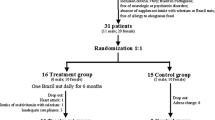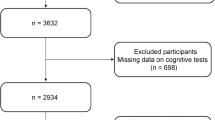Abstract
Purpose
This study was carried out to investigate the effect of vitamins E and C on cognitive performance among the elderly in Iran.
Methods
About 256 elderly with mild cognitive impairment, aged 60–75 years, received 300 mg of vitamin E plus 400 mg of vitamin C or placebo daily just for 1 year.
Background
Demographic characteristics, anthropometric variables food consumption, cognitive function by Mini-Mental State Examination (MMSE), and some of the oxidative stress biomarkers were examined.
Results
Antioxidant supplementation reduced malondialdehyde level (P < 0.001) and raised total antioxidant capacity (P < 0.001) and glutathione (P < 0.01). The serum 8-hydroxydeoxyguanosine remained unchanged (P < 0.4). After adjusting for the covariates effects, MMSE scores following 6- (25.88 ± 0.17) and 12-month antioxidant supplementation (26.8 ± 0.17) did not differ from control group (25.86 ± 0.18 and 26.59 ± 0.18, respectively).
Conclusion
Despite significant improvement in most of the oxidative stress biomarkers, antioxidants’ supplementation was not observed to enhance cognitive performance. A large number of kinetic and/or dynamic factors could be suspected.


Similar content being viewed by others
References
WHO (2012) Dementia: A public health priority: http://whqlibdoc.who.int/publications/2012/9789241564458_eng.pdf
Mecocci P, Polidorib MC (2012) Antioxidant clinical trials in mild cognitive impairment and Alzheimer’s disease. Biochim Biophys Acta 5:631–638. doi:10.1016/j.bbadis.2011.10.006
Nelson AP, O’Connor MG (2008) Mild cognitive impairment: a neuropsychological perspective. CNS Spectr 13(1):56–64
Padurariu M, Ciobica A, Hritcu L, Stoica B, Bild W, Stefanescu C (2010) Changes of some oxidative stress markers in the serum of patients with mild cognitive impairment and Alzheimer’s disease. Neurosci Lett 18(469(1)):6–10
Smith GE, Petersen RC, Parisi JE, Ivnik RJ (1996) Definition, course, and outcome of mild cognitive impairment. Aging Neuropsychol Cogn 3(2):141–147. doi:10.1080/13825589608256619
Baldeiras I, Santana I, Proença MT, Garrucho MH, Pascoal R, Rodrigues A, Duro D, Oliveira CR (2008) Peripheral oxidative damage in mild cognitive impairment and mild Alzheimer’s disease. J Alzheimers Dis 15(1):117–128
Lovell MA, Markesbery WR (2008) Oxidatively modified RNA in mild cognitive impairment. Neurobiol Dis 29(2):169–175. doi:10.1016/j.nbd.2007.07.030
Torres LL, Quaglio NB, de Souza GT et al (2011) Oxidative stress biomarkers in mild cognitive impairment and Alzheimer’s disease. J Alzheimers Dis 26(1):59–68
Shao C, Xiong S, Li GM, Gu L, Mao G, Markesbery WR, Lovell MA (2008) Altered 8-oxoguanine glycosylase in mild cognitive impairment and late-stage Alzheimer’s disease brain. Free Radic Biol Med 45(6):813–819. doi:10.1016/j.freeradbiomed.2008.06.003
Baldeiras I, Santana I, Proença MT, Garrucho MH, Pascoal R, Rodrigues A, Duro D, Oliveira CR (2010) Oxidative damage and progression to Alzheimer’s disease in patients with mild cognitive impairment. J Alzheimers Dis 21(4):1165–1177
Guidi I, Galimberti D, Lonati S et al (2006) Oxidative imbalance in patients with mild cognitive impairment and Alzheimer’s disease. Neurobiol Aging 27(2):262–269. doi:10.1016/j.neurobiolaging.2005.01.001
López N, Tormo C, De Blas I, Llinares I, Alom J (2013) Oxidative stress in Alzheimer’s disease and mild cognitive impairment with high sensitivity and specificity. J Alzheimers Dis 33(3):823–829. doi:10.3233/JAD-2012-121528
Cervellati C, Cremonini E, Bosi C, Magon S, Zurlo A, Bergamini CM, Zuliani G (2012) Systemic Oxidative Stress in Older Patients with Mild Cognitive Impairment or Late Onset Alzheimer’s Disease. Curr Alzheimer Res
Stocker R (2007) Vitamin E. Novartis Found Symp 282:77–87. doi:10.1002/9780470319444.ch6
Masaki KH, Losonczy KG, Izrnirlian G (2000) Association of vitamin E and C supplement use with cognitive function and dementia in elderly men. Neuroiem 54:1265–1272
Morris MC, Evans DA, Bienias JL, Tangney CC, Wilson RS (2002) Vitamin E and cognitive decline in older persons. Arch Newrol 59(7):1125–1132. doi:10.1001/archneur.59.7.1125
Engelhart MJ, Geerlings MI, Ruitenberg A (2002) Dietary intake of antioxidants and risk of Alzheimer disease. JAMA 287(24):3223–3229. doi:10.1001/jama.287.24.3223
Grodstein F, Chen J, Willett WC (2003) High-dose antioxidant supplements and cognitive function in community-dwelling elderly women. Am J Clin Nutr 77(4):975–984
Zandi PP, Anthony JC, Khachaturian AS et al (2004) Reduced risk of Alzheimer disease in users of antioxidant vitamin supplements: the cache county study. Arch Neurol 61(1):82–88. doi:10.1001/archneur.61.1.82
Isaac MG, Quinn R, Tabet N (2008) Vitamin E for Alzheimer’s disease and mild cognitive impairment. Cochrane database Syst Rev 16 (3):CD002854. doi: 10.1002/14651858.CD002854.pub2
Sano M, Ernesto C, Thomas RG et al (1997) A controlled trial of selegiline, alpha-tocopherol, or both as treatment for Alzheimer’s disease. The Alzheimer’s disease cooperative study. N Engl J Med 336(17):1216–1222. doi:10.1056/NEJM199704243361704
Petersen RC, Thomas RG, Grundman M et al (2005) Vitamin E and donepezil for the treatment of mild cognitive impairment. N Engl J Med 352(23):2379–2388. doi:10.1056/NEJMoa050151
Seyedian M, Falamh M, Nourouzian M, Nejat S, Delavar A, Ghasemzadeh HA (2008) Validity of the Farsi version of Mini-Mental State Examination. J Med Counc I.R.I. 25(4):408–414 (Abstract in English)
Yu LW, Latriano L, Duncan S, Hartwick RA, Witz G (1986) High-performance liquid chromatography analysis of the thiobarbituric acid adducts of malondialdehyde and trans, trans-muconaldehyde. Anal Biochem 156(2):326–333
Miller NJ, Rice-Evans C, Davies MJ, Gopinathan V, Milner A (1993) A novel method for measuring antioxidant capacity and its application to monitoring the antioxidant status in premature neonates. Clin Sci (lond) 84(4):407–412
Beutler E, Duron O, Kelly BM (1963) Improved method for the determination of blood glutathione. J Lab Clin Med 61:882–888
Morris MC, Beckett LA, Scherr PA, Hebert LE, Bennett DA, Field TS, Evans DA (1998) Vitamin E and vitamin C supplement use and risk of incident Alzheimer disease. Alzheimer Dis Assoc Disord 12(3):121–126. doi:10.1097/00002093-199809000-00001
Sattler C, Toro P, Schönknecht P, Schröder J (2012) Cognitive activity, education and socioeconomic status as preventive factors for mild cognitive impairment and Alzheimer’s disease. Psychiatry Res 196(1):90–95. doi:10.1016/j.psychres.2011.11.012
Letenneur L, Gilleron V, Commenges D, Helmer C, Orgogozo J, Dartigues J (1999) Are sex and educational level independent predictors of dementia and Alzheimer’s disease? Incidence data from the PAQUID project. J Neurol Neurosurg Psychiatry 66(2):177–183. doi:10.1136/jnnp.66.2.177
Scarmeas N, Luchsinger JA, Schup FN, Brickman AM, Cosentino S, Tang MX, Stern Y (2009) Physical activity, diet, and risk of Alzheimer disease. JAMA 302(6):627–637. doi:10.1001/jama 2009.1144
Buchman AS, Wilson RS, Bienias JL, Shah RC, Evans DA, Bennett DA (2005) Change in body mass index and risk of incident Alzheimer disease. Neurology 65(6):892–897. doi:10.1212/01.wnl.0000176061.33817.90
Kukull WA, Higdon R, Bowen JD et al (2002) Dementia and Alzheimer disease incidence: a prospective cohort study. Arch Neurol 59(11):1737–1746. doi:10.1001/archneur.59.11.1737
Kang JH, Cook N, Manson J, Buring JE, Grodstein F (2006) A randomized trial of vitamin E supplementation and cognitive function in women. Arch Intern Med 166(22):2462–2468. doi:10.1001/archinte.166.22.2462
Luchsinger JA, Tang MX, Shea S, Mayeux R (2003) Antioxidant vitamin intake and risk of Alzheimer disease. Arch Neurol 60(2):203–208. doi:10.1001/archneur.60.2.203
Maxwell CJ, Hicks MS, Hogan DB, Basran J (2005) Supplemental use of antioxidant vitamins and subsequent risk of cognitive decline and dementia. Dement Geriatr Cogn Disord 20(1):45–51. doi:10.1159/000085074
Galasko DR, Peskind E, Clark CM et al (2012) Antioxidants for Alzheimer’disease randomized clinical trial with cerebrospinal fluid biomarker measures. Arch Neurol 69(7):836–841. doi:10.1001/archneurol.2012.85
Miller ER 3rd, Pastor-Barriuso R, Dalal D, Riemersma RA, Appel LJ, Guallar E (2005) Meta-analysis: high-dosage vitamin E supplementation may increase all-cause mortality. Ann Intern Med 142(1):37–46
Lock M, Loblaw A (2005) Vitamin E might increase risk of death. Can Fam Physician 51(6):829–831
Klein EA, Thompson IM, Tangen CM et al (2011) Vitamin E and the risk of prostate cancer: the Selenium and Vitamin E Cancer Prevention Trial (SELECT). JAMA 306(14):1549–1556. doi:10.1001/jama 2011.1437
Rautiainen S, Lindblad BE, Morgenstern R, Wolk A (2010) Vitamin C supplements and the risk of age-related cataract: a population-based prospective cohort study in women. Am J Clin Nutr 91(2):487–493. doi:10.3945/ajcn.2009.28528
Rathi S, Kern W, Lau K (2007) Vitamin C-induced hyperoxaluria causing reversible tubulointerstitial nephritis and chronic renal failure: a case report. J Med Case Rep 1:155. doi:10.1186/1752-1947-1-155
Farina N, Isaac MG, Clark AR, Rusted J, Tabet N (2012) Vitamin E for Alzheimer’s dementia and mild cognitive impairment. Cochrane Database of Systematic Reviews 11; CD002854. doi: 10.1002/14651858.CD002854.pub3
Stuerenburg HJ, Ganzer S, Müller-Thomsen T (2005) Plasma beta carotene in Alzheimer’s disease. Association with cerebrospinal fluid beta-amyloid 1-40, (Abeta40), beta-amyloid 1-42 (Abeta42) and total Tau. Neuro Endocrinol Lett 26(6):696–698
de Oliveira BF, Veloso CA, Nogueira-Machado JA, de Moraes EN, Santos RR, Cintra MT, Chaves MM (2012) Ascorbic acid, alpha-tocopherol, and beta-carotene reduce oxidative stress and proinflammatory cytokines in mononuclear cells of Alzheimer’s disease patients. Nutr Neurosci. doi:10.1179/1476830512Y.0000000019
Rinaldi P, Polidori MC, Metastasio A et al (2003) Plasma antioxidants are similarly depleted in mild cognitive impairment and in Alzheimer’s disease. Neurobiol Aging 24(7):915–919. doi:10.1016/S0197-4580(03)00031-9
Arora A, Willhite CA, Liebler DC (2001) Interactions of beta-carotene and cigarette smoke in human bronchial epithelial cells. Carcinogenesis 22(8):1173–1178. doi:10.1093/carcin/22.8.1173
Kontush A, Mann U, Arlt S, Ujeyl A, Lührs C, Müller-Thomsen T, Beisiegel U (2001) Influence of vitamin E and C supplementation on lipoprotein oxidation in patients with Alzheimer’s disease. Free Radic Biol Med 31(3):345–354. doi:10.1016/S0891-5849(01)00595-0
Giblin FJ (2000) Glutathione: a vital lens antioxidant. J Ocul Pharmacol Ther 16(2):121–135
Spiteller G (2001) Lipid peroxidation in aging and age-dependent diseases. Exp Gerontol 36(9):1425–1457. doi:10.1016/S0531-5565(01)00131-0
Praticò D, Clark CM, Liun F, Rokach J, Lee VY, Trojanowski JQ (2002) Increase of brain oxidative stress in mild cognitive impairment: a possible predictor of Alzheimer disease. Arch Neurol 59(6):972–976. doi:10.1001/archneur.59.6.972
Montine KS, Quinn JF, Zhang J, Fessel JP, Roberts LJ, Morrow JD, Montin TJ (2004) Isoprostanes and related products of lipid peroxidation in neurodegenerative diseases. Chem Phys Lipids 128:117–124. doi:10.1016/j.chemphyslip.2003.10.010
Keller JN, Schmitt FA, Scheff SW, Ding Q, Chen Q, Butterfield DA, Markesbery WR (2005) Evidence of increased oxidative damage in subjects with mild cognitive impairment. Neurology 64(7):1152–1156. doi:10.1212/01.WNL.0000156156.13641.BA
Markesbery WR, Lovell MA (2007) Damage to lipids, proteins, DNA, and RNA in mild cognitive impairment. Arch Neurol 64(7):954–956. doi:10.1001/archneur.64.7.954
Rath M (2003) External and inherited cardiovascular risks: in: Rath M, 4th eds. Why animals don’t get heart attacks, published by Dr. Rath Health Foundation
Husebye E, Engedal K (1992) The patterns of motility are maintained in the human small intestine throughout the process of aging. Scand J Gastroenterol 27(5):397–404. doi:10.3109/00365529209000095
Lloret A, Badía MC, Mora NJ, Pallardó FV, Alonso MD, Viña J (2009) Vitamin E paradox in Alzheimer’s disease: it does not prevent loss of cognition and may even be detrimental. J Alzheimers Dis 17(1):143–149
Acknowledgments
This study was supported by Institute of Nutritional Sciences, University of Vienna and the Vice-chancellor for Research, Tehran University of Medical Sciences (TUMS), Iran, by a Grant (No. 11126).
Conflict of interest
The authors declare that there are no conflicts of interest.
Author information
Authors and Affiliations
Corresponding author
Rights and permissions
About this article
Cite this article
Alavi Naeini, A.M., Elmadfa, I., Djazayery, A. et al. The effect of antioxidant vitamins E and C on cognitive performance of the elderly with mild cognitive impairment in Isfahan, Iran: a double-blind, randomized, placebo-controlled trial. Eur J Nutr 53, 1255–1262 (2014). https://doi.org/10.1007/s00394-013-0628-1
Received:
Accepted:
Published:
Issue Date:
DOI: https://doi.org/10.1007/s00394-013-0628-1




